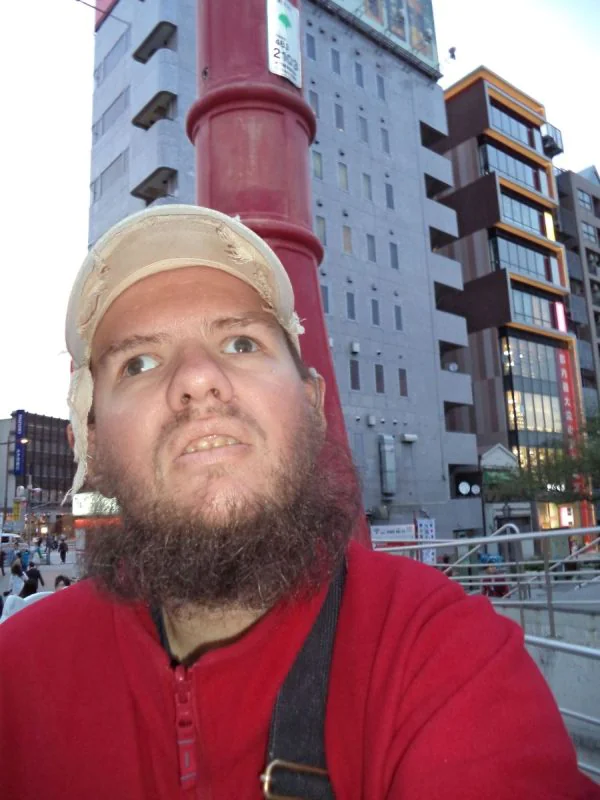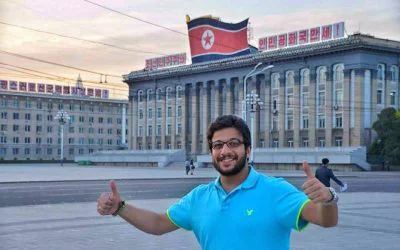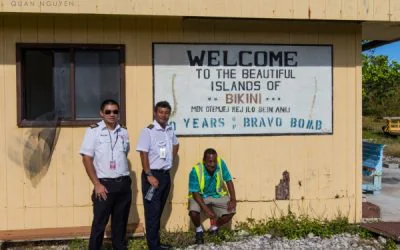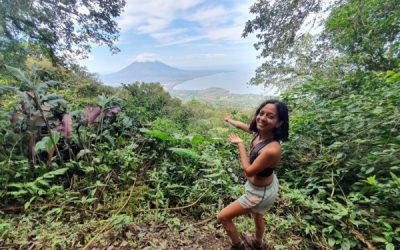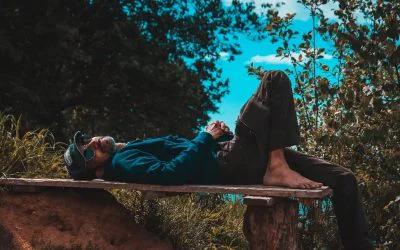Today, we are absolutely humbled at our truly special guest, the man behind the website Tony the Traveller. As you will read below, Tony Giles is so much more than a cheerful, open-minded and inherently inquisitive traveller who also has a taste for adrenaline and adventure. We usually edit longer interviews, but on this occasion we have let Tony’speak’ as long as he has seen fit about his considerable trips despite all the obstacles he was born with.
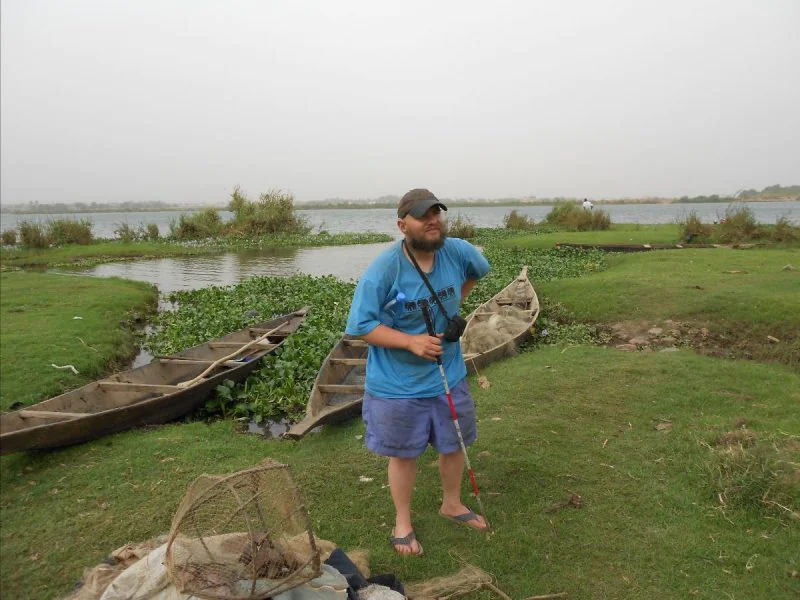
Tony, please tell us something about your early days and your unusual story.
I was born with a rare eye condition, sensitivity to bright light, which essentially meant I couldn’t open my eyes in any light, so was technically blind from birth. I was given dark glasses around the age of three, and was able to run around and ride a large three-wheel bike and explore my dead-end street and play with friends. I could sense the space around me from a young age.
The dark glasses meant I could open my eyes and, with limited sight, could get about. I went to a school for disabled children when five; an hour-long car journey from my home to school and back, in South-West England. So, you could say, this was my introduction to travel! From a young age, being driven back and forth to school, I made up stories. I was told that we drove through a wooded area and I pretended I had a friend called Eky, who lived in the woods and had adventures. So from a young age I had an imagination and an active brain.
I was able to read and write, with my eyes being sensitive to light and dark, I could make out the outlines of large letters drawn in black inc. Thus, I learn basic letters and numbers. However, by the age of ten or so, my sensitivity to distinguishing the difference between black and white lines and other black and white objects was deteriorating and I needed to learn braille (the tactile dots blind people use to read-write) and have mobility training, in order to become independent. (I was born with no colour nerves in my eyes).
I also became slightly deaf in both ears around the age of four/five, also nerve damage. I was given basic hearing aids and got on with living and learning. My hearing has become progressively worse over time and I now use powerful digital hearing aids to hear. Without my hearing aids, I could not go outside, cross roads, have conversations, interact socially, travel! I could learn deaf-blind sign language, a series of tactile letter shapes made on one’s hand by another person, but I couldn’t use this to travel.
I attended a boarding school three or four hours drive from my home. Here I learnt mobility, how to use a long white cane to find possible objects on the ground to avoid tripping, how to safely approach and go up and down steps, negotiate doorways, go from one point to another and remember a route, using fixed landmarks like lampposts, gates, count road crossings etc. I was taught to use my memory and train it to be alert for changes in my surroundings, new sounds, changes in traffic, new and unusual sounds, etc.
Eventually, I learnt how to cross roads without audio lights, catch buses, ask the public for help and finally, catch trains, so I could travel home to my family. When aged sixteen I got the opportunity to visit Boston, USA with my school and loved it. Everything was new and different. I allowed all my senses to absorb every sensation. This was my introduction to travel and I desired more.
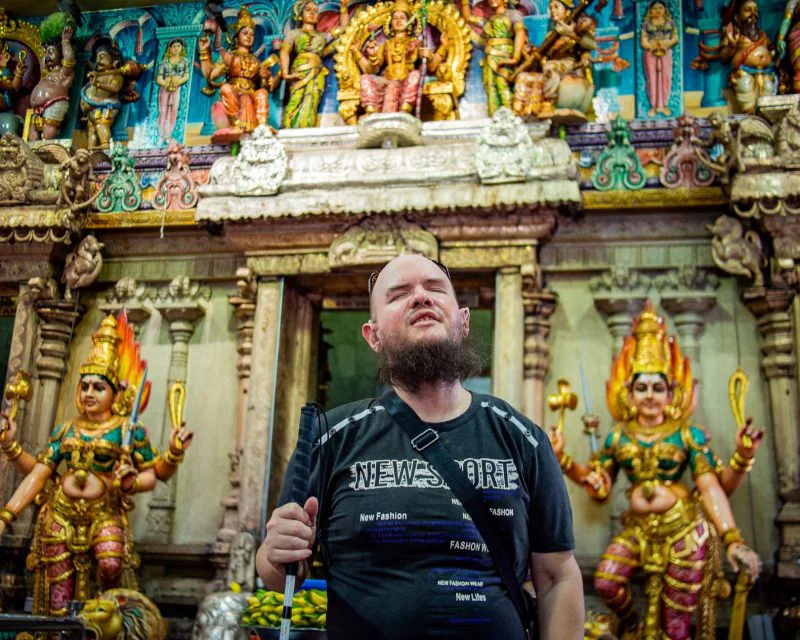
Just to sum it up for our readers, could you please let us know what kind of seeing, hearing and other difficulties you have experienced so far? And, how in the world did you get the courage to ditch all that and go travelling?
So, I was basically born blind, though had some light perception until around the age of eleven, twelve or so. My light sensitivity disappeared slowly and objects became more difficult to see/sense. I relied more on my mobility training and my memory to become mobile and independent. I became slightly deaf around four/five, was given basic hearing aids and learned to use what hearing I had to communicate and learn. This became more difficult as time progressed.
Particularly in social settings such as in noisy places; cafes, pubs, large groups etc. The combination of being blind and partially deaf also made travelling about alone difficult, especially if there was noisy traffic, heavy construction and, in particular, strong wind, which would rush over the hearing aid’s microphone, causing me to lose all sense of sound and direction. This would make crossing roads very difficult. But I adapted, I used my brain and discovered ways around such difficulties. I was determined from early on to be independent and travel!
After my first few years of travelling, mostly in countries like the USA, Australia, New Zealand, where I could speak the language and understood much of those countries infrastructures, I gained high confidence in my ability and ventured to more difficult countries like Vietnam and Thailand, where there was less English-speaking people and no infrastructure! How did do it? Deaf, blind, alone in foreign countries? And later on with damaged kidneys and high blood pressure?
Well: I simply put one foot in front of the other and said to myself; “Tony, this is the challenge you want. This is the adventure, now get on and enjoy it!” So I did, and I had a blast doing it!
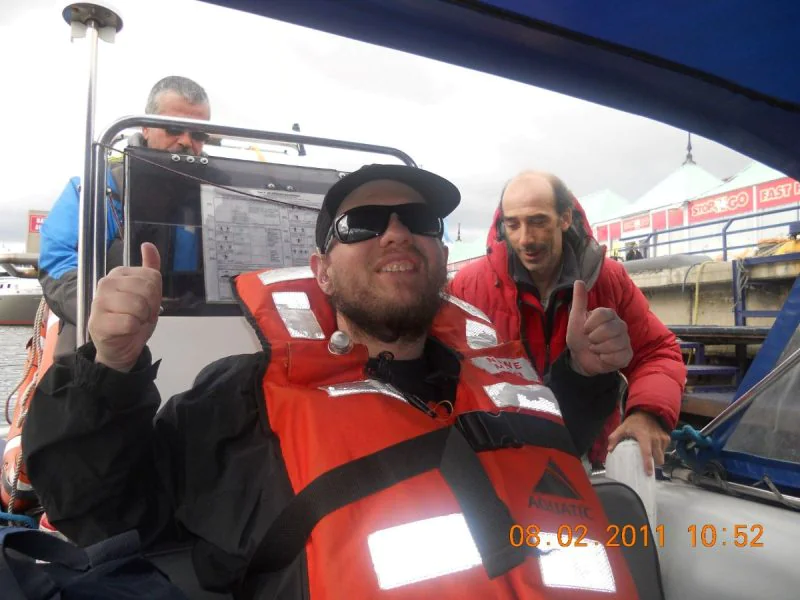
How do you experience your travels and make up for not actually visually seeing the countries and sights?
When I first started travelling, around the age of fifteen/sixteen, I was mainly out for adventure and escapism. I went camping with a friend who only has sight in one eye. We attended rock gigs and festivals like Reading and Donnington.
As my confidence in my mobility increased I attended gigs alone. I met like-minded sighted people who looked after me and ensured I was safe. When I first ventured abroad, around the age of twenty, it was about adventure and excitement. I new little about the countries and cities I was visiting, it was about having fun, getting drunk, getting laid and trying anything available! I did little research for my early trips.
Back in 2000 – 2001 – 2002, I didn’t really have internet access so got my mum to read the Lonely Planet guidebooks about the cities in say, Australia and New Zealand. I’d heard of the main cities through my studies and figured I’d learn about attractions and activities by word of mouth – a method I still used to this day.
It was in Australia and New Zealand that I discovered I enjoy adrenaline activities, bungee jumping etc. I loved the buzz and the thrill, hanging out with other young, like-minded party-crazed people. It was a blast! As I’ve become older and travelled to more ‘off the beaten path’ countries, I’ve discovered my interests and how I come to ‘see’ a country, city, visitor attraction.
Now I want to experience the local culture and stay with local people, eat the local cuisine, hear about a country’s history and culture intimately instead of getting drunk every night and just visiting the usual tourist traps. I see a country through its smells, good and bad. A country’s sounds of music, lively markets, birds and insects chirping and chatting.
By walking in the forests and up and down mountains and feeling the various terrains under my feet. Going up a mountain is relatively easy, I simply follow the upwards or downwards gradients and use the voices and footfalls of other hikers to guide me. I like the sound of flowing water, So when planning any trip, which I now do, I search on the internet, using a screen-reading speech software to help me navigate and read websites, I search for waterfalls and/or fountains in the destinations I’m visiting.
I love history, especially war history, so once I know which places I wish to explore, I search for museums that have audio guides or guided tours or find free guided walking tours of the various locations I’m travelling around. Being blind gives me an advantage when on a guided walking tour, because whilst most of the tourists are admiring the attraction on show, I’m soaking up the info presented by the guide. I remember the information easier, because I’m not distracted by visual images or sights.
Eating new and different or unusual cuisines is a big component of my travels to any country. I love trying new foods. I find food a big and important part of a country’s culture. So I use all my senses to ‘see’ and try and understand a country/city/place I visit. What a destination looks like, Is mostly all in the mind in the end. Plus, whether we can see or not, when we travellers visit any nation/foreign city, it’s the people that matter. Without people, there is no country. And I don’t need sight to converse with people!
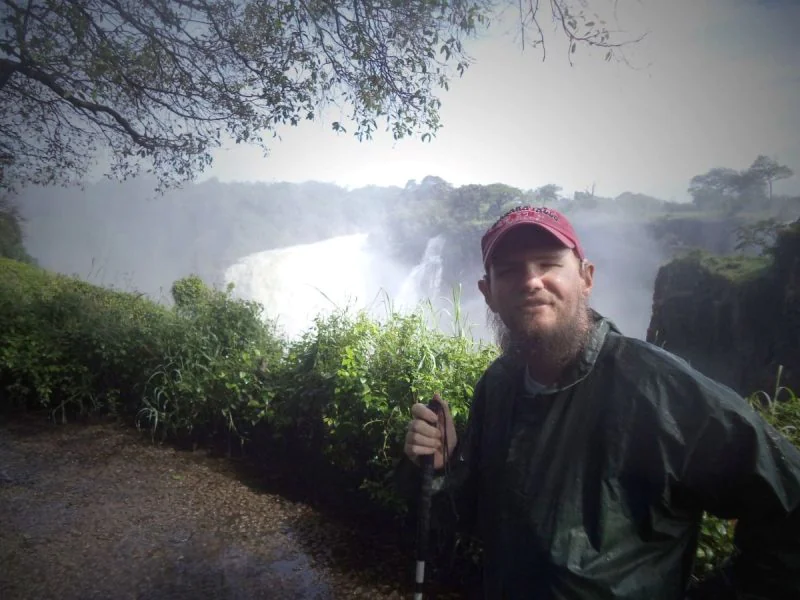
What drives your travels and the wish to visit all countries of the world, the most?
I’m passionate about travelling! It’s my challenge, it’s what I’m good at! The idea of attempting to visit every country/nation in the world to me is a fun way to spend my life. And the more difficulty in reaching and exploring a destination, the more excited I become!
You mentioned before that you owe it to your excellent education that you received for your independence and, well, courage for travelling. But, how do you feel that your country of origin affected your view of the world?
I’ve had a fantastic, almost one-to-one, education and obtained both a BA and MA at university. Studying gave me the skills to think on my feet, ask lots of questions and view situations from a variety of views. However, I feel being born and living in the UK gave me a somewhat skewed view of the world until I travelled. I imagined British colonialism was positive for Africa, Asia etc. How wrong I was! Because of my English education and background, I assumed much about the world. Travelling broadened my horizons and made me a better person.
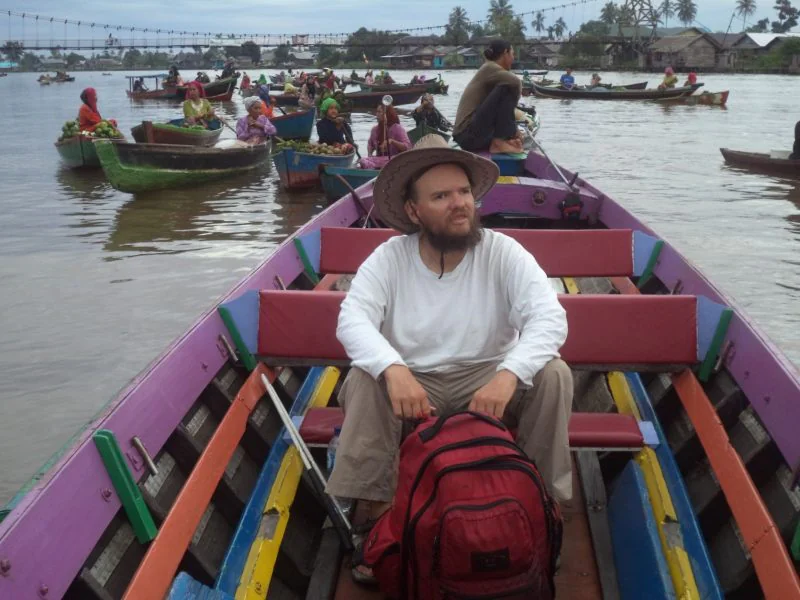
When do you plan to achieve your goal of visiting all countries? By the way, how do you define a country and what is the total count of your list of countries?
I plan to complete my visit of all world countries before I die! �. I figured I would have visited every country by the age of sixty, I’m forty-two at present, so in theory, I have another eighteen years. However, because I had a kidney transplant in 2008,it means I can’t have a second Yellow Fever vaccine, so I need to visit the remaining twenty or so countries in Africa that, allegedly, have Yellow Fever, in the next seven years.
To me; a country is a place with it’s own governance of some kind and its own identity, whether it be language, cuisine, unique history, cultural customs, national identity, etc.
Thus far, I’ve visited one hundred and forty-six nations with one hundred and twenty-five on the UN’s list. I think there maybe as many as two hundred and seventy of so countries/nations. I also wish to visit all two hundred and twenty-seven inhabited Greek islands! Plus, every region on the NomadMania list!
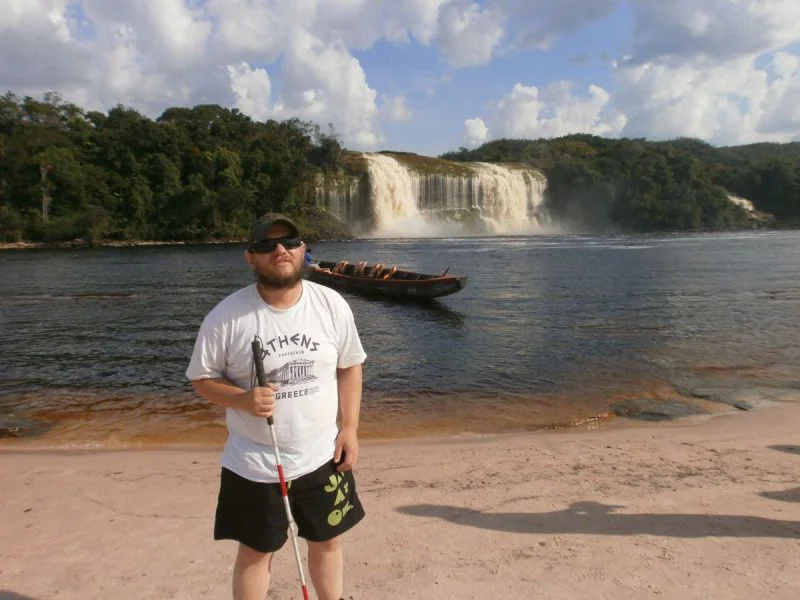
You enjoy bungee jumping while travelling. Could you try and explain how you feel while doing a jump? Are there any other extreme things that you enjoy doing?
Bungee jumping is fantastic and, for me, thrilling! I’ve jumped seventeen times so far and love it! Try to imagine standing high up on a bridge or platform with the open air all around you. You can feel the wind and sometimes feel the structure you’re on moving. You know you are high up and there is a big drop in front of you because you’ve been told how high the structure is and the hight of the bungee. However, you don’t really know what you’re jumping off into and can’t really judge how far you will fall or when the bounces will occur.
Your ankles are tied together, you are helped to the edge, your toes poke out in to thin air. You’re told you will be tapped three times on the back and then fall/jump forwards and fall!!! As a blind person, you just hope that the instructors have remembered to attach the bungee cord! �. So, on three taps, you fall forwards, arms above your head and drop into emptiness.
You fall like a stone and for a few seconds you’re simply dropping, the air rushing across your body and the bungee cord and body harness pulling on you. Then, suddenly, bang; the bungee recoils and you bounce! Your entire body explodes with energy and shock! It’s unexpected. Your arms fly out, your head snaps back, your back arches and you scream with joy or terror! It’s an adrenaline rush.
You go flying up with a huge bounce and then drop down again. It happens again and again. Before, finally, the bounces stop and you are left hanging upside-down, dangling by your ankle strap or body harness. At this point the strain from the heavy bungee cord starts to pull on your body and you feel like you’re being stretched apart!
The bungee cord pulling you up, whilst, simultaneously, gravity is pulling you down! What fun! I also enjoy other adrenaline activities. I’ll try most physical activities once. I’ve sky dived three times, been white water rafting in several countries, including on the Zambezi River in Zambia. sea kayaked in New Zealand, water skied in the UK.
Damaged a shoulder sandboarding down a volcanic mountain in Nicaragua, driven a jet boat, ridden on a jet ski, which was most thrilling! Abseiled, rock climbed, gone zorbing twice, and much more! I still want to ski on snow, drive an army tank, go dog sledding, try ice climbing and drive a snowmobile, amongst other things!
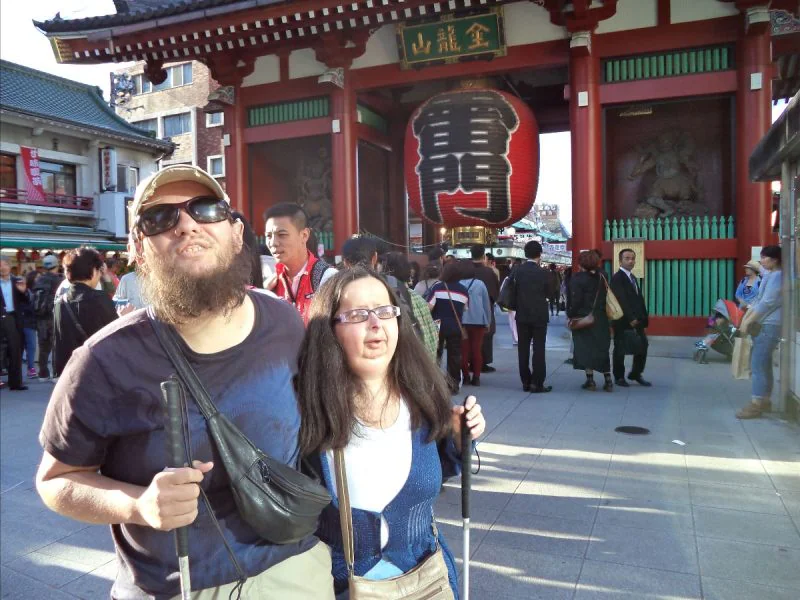
Could you share some travel stories with us?
I have so many travel stories: I’ve been journeying for at least twenty years! That’s why I wrote and published three travel eBooks!
However, here’s a short tale that’s not in my books yet.
I journeyed through West Africa back in 2012. I started in Morocco and, with help from locals and fellow travellers I met along the way, slowly made my way down the coast. I passed through Western Sahara, Mauritania, North Senegal, and the Gambia into South Senegal. I was heading to the Casamance to meet an English guy living in Senegal who I’d met online.
To cut a long story short, we finally met one evening as I was exiting a taxi on a dusty road in a small town, somewhere near the Casamance region. The guy spotted me and all was well. I experienced a few delightful days of local Senegalese Casamance culture and planned to continue my journey south into Guinea Bissau, where a local couchsurfer was expecting me.
However, on the morning I was to depart, my host checked my emails for me and we learned that the couchsurfer in Bissau begged me not to come. Apparently, there had been elections in Bissau and one of her friends had been shot in a fight. Things were unclear. I wasn’t exactly sure what to do. The long-term goal was to get to Mali and visit Timbuktu.
The English guy who’d hosted me in Senegal said, “no problems, you simply do the route in reverse.” My final destination of the entire trip was back to Dakar, Senegal’s capital, to fly home. Therefore, I travelled to Ziguinchor, the Casamance capital and spent one night there.
Then I took a very long car journey across Senegal’s southern and eastern regions to some town near Mali’s northwest border. That was a fun adventure! I shared a seven seater car with nine other passengers and the driver. The journey was bumpy, dusty, hot, slow and I was squashed from all sides throughout the entire ride! It was an experience though.
The following afternoon, transport from Mali eventually arrived and I crossed the border in another crowded, decrepit vehicle. I secured a visa to enter Mali and travelled to the first large city, some three hours distance from the border. Once there, I enquired about transport south to Bamako, Mali’s capital. A bus departed sometime in the evening and would take roughly eighteen hours! Someone helped me onto the large coach when it arrived and I settled down for the long trip.
However, after only one or so hours into the journey, I suddenly realised we had turned around and were returning to the starting point. Being unable to speak French or any local languages, I didn’t understand what was happening. Upon arrival back at the bus station from which the journey had begun, I was put on a large concrete step and told to wait. Someone from the bus company said ‘six o’clock’ and left me alone.
A DJ played loud African music all night while I tried to sleep on the hard slab. Around six am I was woken and helped back aboard the coach. I slept most of the way to what I thought was Bamako, getting food each time the coach stopped. Kind local people on the bus assisted me and, using a few words of basic French, I managed to discern that there was some kind of security crack down in the country. Finally, around six in the evening. The coach came to a shuddering stop, the driver cut the engine and I thought, ‘great, I’ve finally arrived in Bamako’.
Unfortunately, not! We were some eight miles (twelve kilometres) from the capital. But, apparently, the bus driver would not, or could not, go any further. Six pm in Mali meant dusk and almost night and no light. Therefore I spent another night sleeping rough, though this time, on the bus instead of on the ground.
Early the next morning I arrived in Bamako, Mali’s scattered capital and, with yet more help, managed to get a taxi to take me to the Sleeping Camel, my accommodation in that city. Upon entering, I was greeted by several astonished foreign travellers. I don’t think any of them had met a blind traveller before. They asked me where I’d come from and when I replied “Senegal” They couldn’t believe it.
One of them cried, “impossible, the borders are closed, there’s been a military coup de tete, the government is in hiding!” I replied “OK: I’ll have a cup of tea please!” However, unfortunately, it was real. This meant I couldn’t go anywhere or even explore Bamako! I was basically stuck in Bamako until the borders were re-opened. This happened after a week and I escaped to Republic of Guinea. Where one adventure ended and another one began!
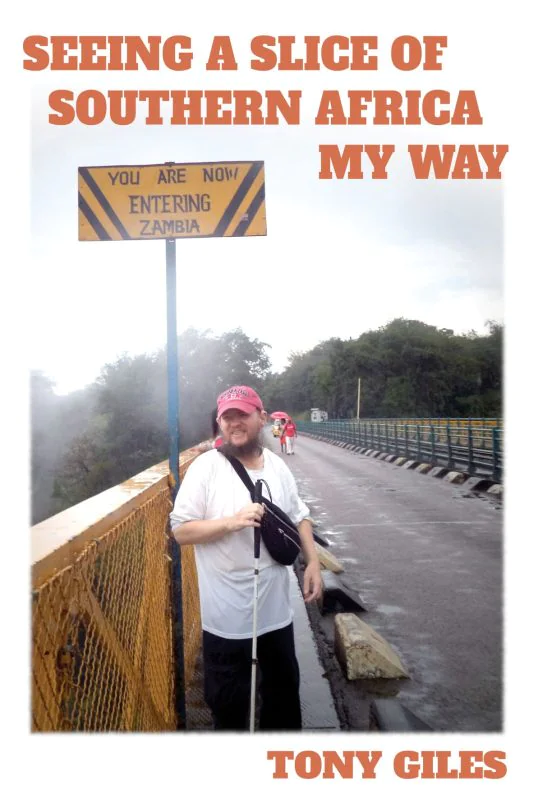
How do you prefer to travel and what are your biggest travel interests?
I prefer to wander alone, meeting like-minded travellers along the way and, where possible, staying with, and/or meeting and interacting with the local people. I find that’s the best way to really discover a country and its culture. I’ll travel on any transport, the rougher the journey, the better. I need to really feel the journey to fully enjoy and appreciate it.
Travelling in and around Cape Town and along the ‘Garden Route’ in South Africa was tremendous fun for me, as there were so many mountain roads to drive along. I felt every twist and turn along those many roads and it was these features that gave me some insight to what the country’s geography might be like. Flying is OK, it get’s one from A to B, but it’s mostly boring unless there’s some turbulence! Plus, these days, with all the security, it’s just a hassle.
Train travel is good because one can walk about and also get a feel for the motion and direction of travel and the sound of a train traversing the tracks or speeding through a long tunnel is exhilarating. Likewise I enjoy journeying by boat, not cruises, but ferries or traditional vessels or coastal trips. Sailing vessels are best, I can feel the wind on my face, hear the sails flapping in the breeze and smell the salt air in my nostrils – delightful. I worked on a tall ship for the disabled for several days when aged seventeen and it was a wonderful experience.
The sea is in my blood. I often meet people when journeying and travel with them for a few days, but ultimately, I’m happiest venturing by myself. My main travel interests evolve around learning about a country’s history and culture, via audio guides in museums or on city walking tours. I also enjoy trying new and unusual cuisines, participating in adrenaline sports, walking and hiking, attending rock gigs, socialising with local people in small groups and moving. I need to be moving.
For me, the real challenge is trying to get from one destination to another the cheapest and most interesting way possible. I love that challenge; the unknown of what might happen, or who I might meet, the possibilities are endless.
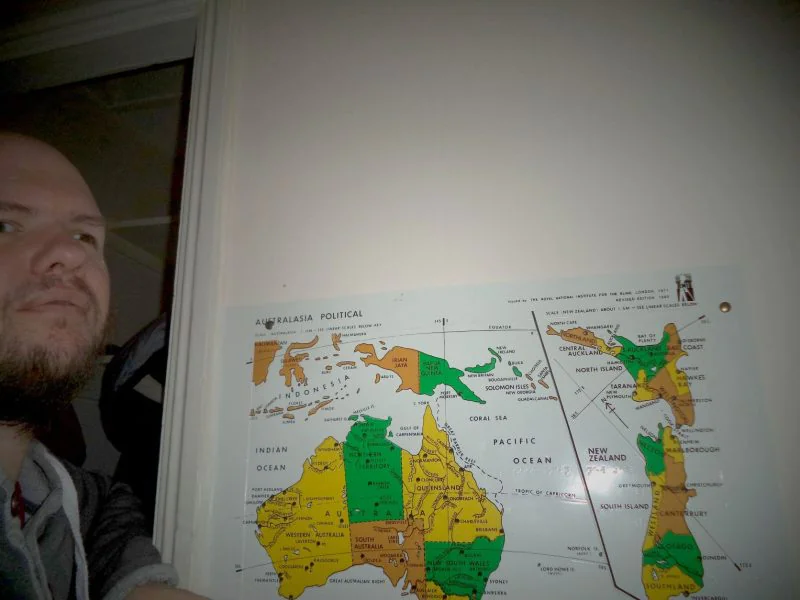
You are praised by other people, people you inspired, as very light spirited and with a good sense of humor. Were you always like that, or is this something that you learned along the way? How did this influence your travels, in your opinion?
I wasn’t always ‘light spirited’ as you put it! When I was young, especially in my teenage years, I was quite grumpy and often angry! Alongside the usual teenage moodiness and grumbles, I was frustrated with myself. I wanted to meet girls and get laid, but didn’t really know how to achieve this. I was angry about being totally blind and partially deaf, particularly in social situations where I struggled to communicate.
Through travelling and interacting with people in less noisy environments and having to speak slower with people whose first language wasn’t English help me to realise that many people struggle to communicate at times. I also discovered that people liked me for being me and didn’t just want to help me out because I was disabled. I relaxed more and my frustrations with my disabilities lessoned as I came to terms with it. I cracked jokes about my blindness in order to make people I met feel more relaxed with it and able to ask questions.
Becoming more comfortable with my disabilities and with myself allowed me to relax and find my true, confident, relaxed, funny and amusing character. This, I feel, has allowed me to make friends in many countries around the world and made travelling an easier and more delightful experience for me and the many people I meet along the way.
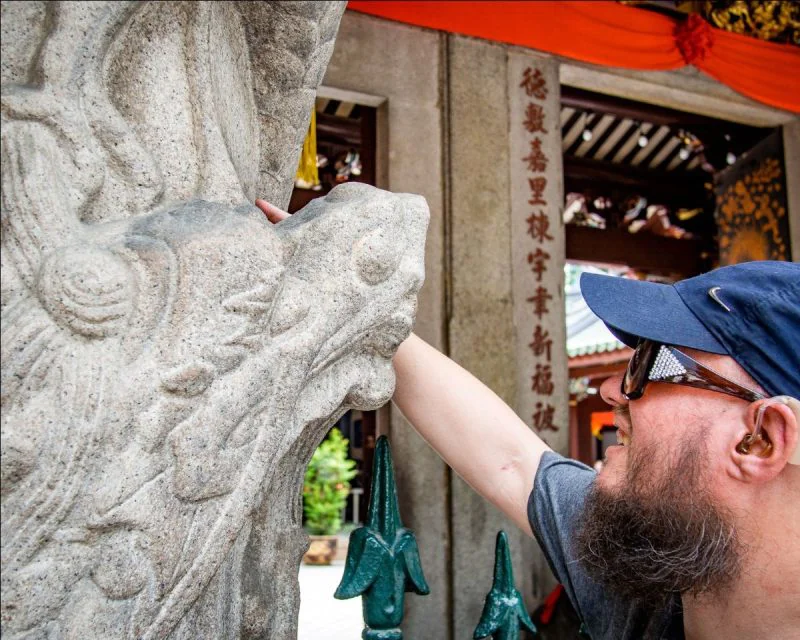
We have one question that we ask all of our guests, our signature question: if you could invite 4 people from any era to dinner, who would your guests be and why?
The four most interesting people I’d like to invite to dinner would be: Sir Winston Churchill. I admire what he achieved for the UK and British people during World War II and I’d love listening to his endless stories and charming wit.
My second guest would be Bob Dylan. Simply because I love his music, especially the lyrics of his early songs! They’re so full of dry humour and irony! Again, I feel he’d be fun and amusing company as he’s lead a colourful life up to now!
Third would be the famous science fiction writer, Stephen King, to add a little horror and dark humour to proceedings. I find King’s novels dark, fascinating and often hilarious and thought-provoking all at the same time!
Finally, I’d invite to my quartet, Martin Luther King Jr., for a little spiritual and intellectual substance. I think King’s non-violent philosophy might be a fascinating counterbalance to Churchill’s more outspoken views.
This stimulating quartet would certainly provide for a lively and entertaining debate and conversation.
I would have liked to have invited a woman to the party, but I feel the above four characters outweigh any of my female choices, such as Margaret Thatcher, Nina Simone or Janis Joplin.
